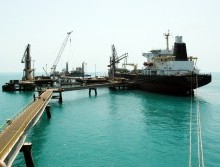
Sea trade is one reason we’re buying off Egypt. Oil Tanker. Illustrative. Photo Courtesy of U.S. Navy. Photo by Mass Communication 2nd Class Nathan Schaeffer
Millions are in the streets again in Egypt. One year after the new president was elected, they’re calling for him to step down. You might be thinking it’s just crazy politics and you might ignore the fidgety revolutionaries “over there.” You’d be wrong.
Egypt is a major ally in the war-torn and oil-rich Middle East, which is enough to make the events there matter to the world at large. But there are many other reasons why Americans and Europeans should care about the revolving revolutions in Egypt. Millions in fact.
For one thing, Egypt receives an enormous amount of financial aid, funded by your tax dollars. We’re talking billions of dollars. The US alone contributes about $1.5 billion every year. Europe is a little lower than that, but a cool 1 billion Euros since 2007 is nothing to sneeze at.
And what does this buy us? Peace of mind, first and foremost. You see, Egypt controls the Suez Canal. That means they control perhaps the most important link between the Middle East and the West. Oil, Japanese cars, and more find their simplest and shortest route to Europe and the Western world through the Suez—which links the waters of Saudi Arabia and Kuwait with the Mediterranean Sea and Italy and France.
Think of it like a toll road on a very busy highway. True, you could wait in awful traffic for hours and take twice as long to reach your destination, or you could take the nifty Suez shortcut. Trade is a key asset controlled by Egypt that prevents a global economic traffic jam.
Navies use it too. It’s the only direct naval link between the shores of Iran and those of Spain or Israel. The US and Europe can also move ships through it as well.
What’s more, Egypt is the largest Muslim country in the Arab world. According to the CIA, an estimated 85 million people live in Egypt. It’s military is no longer among the most feared in the region, but its still formidable (thanks in part to all that financial aid). And with the West’s money flowing in, Egypt is currently on our side versus Iran and other regional enemies.
So Egypt is a key player, and we’re paying to keep them there. Looking at the money the US and Europe send Egypt, it becomes clear they must either be buying them off or trying to boost their security, because the tangible benefits of literally billions of our tax dollars are otherwise quite small.
According to ForeignAssistance.gov, the American government’s website on where their public dollars are going, the US appropriated more than $1.6 billion to Egypt last year. Of that, $1.3 billion went to “peace and security.” $28 million went to human rights. Yes, the graphic on the website shows a nice tall colored bar for the security funds. You can barely see the lines for human rights and health.
Officially, just $2.8 million goes to counterterrorism, but $1.3 billion goes to “stabilization operations” (read: keeping the peace with Israel and keeping the country generally stable) and “security sector reform” (read: training the army and local security).
In other words, the US sends billions to Egypt apparently to help them stay strong at home and maintain their role as a powerful friend in the Middle East (read: buying an ally). The Daily Beast reported that US Secretary of State John Kerry actually greenlighted the next round of $1.3 billion in security aid by waiving the condition that Egypt’s political freedoms improve first. The reason given was “national security.”
Europe’s handling of Egypt is similar. A report from the European Court of Auditors recently found that despite receiving roughly 1 billion Euros since 2007, Egypt has generally not been held to the goals and policies the Europeans had set for their aid. Ironically, with millions going to budget assistance in Egypt, issues of corruption and transparency are still concerns.
So even if the European money is designated for peaceful, helpful uses, it does not appear that Egypt is making the expected progress in those areas.
And now to connect all these billions with what’s happening today. The government of Egypt remains corrupt, its human rights record is troubling and it’s led by the Muslim Brotherhood—a former terrorist group. President Mohammed Morsi is not a friend of ours, but so far has been generally willing to play along for the time being. Still, under his leadership, Egypt has at times appeared more open to growing ties with American enemies such as Hamas and Iran.
That means that a new revolution that overturns Morsi’s government could help the West. It could lead to better use of our billions.
At the same time, should the Egyptian military launch a coup and Morsi fight back, well, that could lead to the West effectively funding an Egyptian civil war. Considering Egypt’s vital location for Middle East sea trade via the Suez Canal, that could harm the world economy on numerous levels. Ready for higher gas prices? That could be on the way.
So keep watching the Egyptian political chaos. You have billions of reasons to care about what happens there.
(By Joshua Spurlock, www.themideastupdate.com, July 2, 2013)
